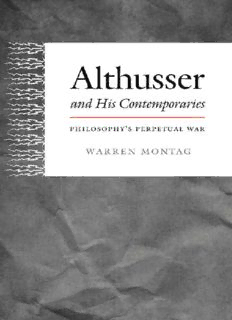
Althusser and His Contemporaries: Philosophy's Perpetual War PDF
Preview Althusser and His Contemporaries: Philosophy's Perpetual War
Althusser and His Contemporaries POST- CONTEMPORARY INTERVENTIONS Series Editors: Fredric Jameson, Michael Hardt, and Roberto Dainotto Althusser and His Contemporaries PhIlOSOPhY’S PERPETuAl WAR Warren Montag Duke University Press Durham and London 2013 © 2013 Duke University Press All rights reserved Printed in the United States of America on acid- free paper ♾ Designed by Courtney Leigh Baker Typeset in Galliard by Tseng Information Systems, Inc. Library of Congress Cataloging-in-Publication Data Montag, Warren. Althusser and his contemporaries : philosophy’s perpetual war / Warren Montag. pages cm—(Post-contemporary interventions) Includes bibliographical references and index. ISbN 978-0-8223-5386-7 (cloth : alk. paper) ISbN 978-0-8223-5400-0 (pbk. : alk. paper) 1. Althusser, Louis, 1918–1990. 2. Structuralism. 3. Poststructuralism. I. Title. II. Series: Post-contemporary interventions. b2430.A474M66 2013 194—dc23 2012048670 Para Dolores, Elisa y Jacobo גאטנאמ ףסאי לאומש ןופ קנעדנא ןיא Contents ACkNOWlEdgMENTS ix INTROduCTION Why Read Althusser Today? 1 PART I Structure Chapter 1 The Theoretical Conjuncture Structure, Structurality, Structuralism 15 Chapter 2 Toward a Prehistory of Structuralism From Montesquieu to Dilthey 23 Chapter 3 Settling Accounts with Phenomenology Husserl and His Critics 36 Chapter 4 Lévi- Strauss Ancestors and Descendants, Causes and Effects 53 Chapter 5 Between Spinozists The Function of Structure in Althusser, Macherey, and Deleuze 73 PART II Subject Chapter 6 Marxism and Humanism 103 Chapter 7 Althusser and Lacan Toward a Genealogy of the Concept of Interpellation 118 Chapter 8 Althusser and Foucault Apparatuses of Subjection 141 PART III Origin/End Chapter 9 The Late Althusser Materialism of the Encounter or Philosophy of Nothingness? 173 Chapter 10 The End of Destiny Althusser before Althusser 190 AfTERWORd 209 NOTES 213 bIblIOgRAPhY 231 INdEx 243 Acknowledgments Étienne Balibar and Pierre Macherey have encouraged and challenged me in innumerable ways, opening up paths that I am still exploring. I couldn’t have written a book like this without their help and generosity. I also want to acknowledge one of this work’s absent causes. In the summer of 1983, a few months before his unexpected death, I spent a week with Michel Pê- cheux translating “Discourse: Structure or Event” page by page as he wrote it. I remember every word of the extraordinary conversations we had, and they helped shape my view of Althusser and of his philosophical moment. I discovered Althusser with G. M. Goshgarian many years ago, and, for- tunately, we continue to argue about his texts even today. I have benefited in many ways from his help and expertise. Gregory Elliot, whose work transformed the study of Althusser in English, has been a great friend and inspiration. My comrades and friends who make up the editorial collective of Dé- calages have provided the kind of community in which thought flourishes: Aurelio Sainz Pezonaga, Juan Pedro Garcia, Filippo Del Lucchese, Vittorio Morfino, Giorgos Fourtounis, Jason E. Smith, and Matt Bonal. I want to express my gratitude to the founders of Rethinking Marxism, especially Jack Amariglio, David Ruccio, Antonio Callari, and Rick Wolff, who have been supportive of my work from the beginning. I also want to acknowledge the following people without whom the book would not have been what it is: Nancy Armstrong, Yann Moulier Boutang, Sebastian Budgen, Alex Callinicos, Michel de Certeau (1925– 1986), Won Choi, Dan Fineman, Alain Gigandet, Michael Hardt, Spencer Jackson, Mateusz Janik, James Kavanagh, William Lewis, Jacques Lezra, François Matheron, David McInerney, Pierre- François Moreau, Antonio Negri, Jason Read, Elisabeth Roudinesco, Juan Domingo Sanchez, Hasana Sharp, Michael Sprinker (1950–1999), Ted Stolze, Peter Thomas, André Tosel, and Maria Turchetto.
Description: